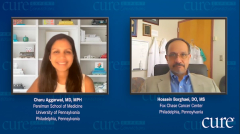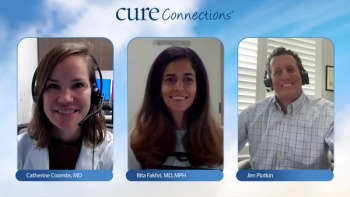
Predictive and Prognostic Biomarkers in NSCLC
Drs. Charu Aggarwal and Hossein Borghaei comment on the importance of having predictive and prognostic biomarkers in non-small cell lung cancer and highlight their approaches to testing patients prior to initiating therapy.
Episodes in this series

Charu Aggarwal, M.D., MPH: There’s a lot of interest in biomarker testing, so how about we talk about biomarker testing? I’ll start. Biomarkers are basically factors. They could be patient-related factors, tumor-related factors, or other tests we perform that can inform treatment decision. We recommend biomarker testing universally for patients with non-small cell lung cancer to guide therapy, especially in the metastatic and advanced stages. There can be several different forms of biomarkers. The way I teach my medical students and fellows is I say that apart from tests, there can also be other biomarkers. We know that smoking, or the lack of, can also be a biomarker, because that can also tell us a lot about the disease, the biology, the natural behavior, and progression.
But when we think about tests that may be used as biomarkers, we often think of guideline-recommended biomarkers. We broadly categorize them into tests that tell us whether the disease is going to respond a certain way. We call those prognostic biomarkers. Then we think about predictive biomarkers, which tend to be more the biomarkers that will tell us how a treatment is going to work. I tend to think of biomarkers very broadly as telling me about the application of either immunotherapy or targeted therapy in lung cancer.
We now have national guidelines, including from the National Comprehensive Cancer Network, organizations such as ASCO, which is the American Society of Clinical Oncology, as well as the International Association for the Study of Lung Cancer, recommending that we test for at least seven genetic alterations upon a new diagnosis of non-small cell lung cancer with patients with nonsquamous histology, but also for certain patients who may have a squamous histology. This is based on the fact that we now have drugs available that we should be using in place of either chemotherapy or chemoimmunotherapy once a discovery of such a biomarker is made. I usually perform gene sequencing for the targeted biomarkers, and then PD-L1 testing to determine whether patients should get immunotherapy alone or a combination approach. What do you think, Hoss? How important is molecular testing in patients with lung cancer?
Hossein Borghaei, DO, MS: It’s significant, and just as important as knowing what the stage of the disease is. I don’t want to make any treatment decisions until I know the biomarker status of the patient sitting in front of me. As you pointed out, there are now at least seven, maybe more, markers that we routinely recommend you acquire before we make a treatment decision for our patients. Because as you pointed out, we have targeted therapies that are FDA approved. They work really well. Therefore, it’s an important component of what we should be doing.
My goal in my clinic is that we get 100% of molecular testing done before we initiate any kind of treatment. Of course, sometimes that’s not possible in cases where we have a legitimate medical reason for starting treatment. I tend to start with a platinum doublet chemotherapy without any immunotherapy until we have a full picture of these molecular drivers, regardless of the smoking history of our patients, because that can have a huge impact on how we manage the disease and patients’ quality of life, as opposed to having to come in every three weeks for IV [intravenous] chemotherapy and all the timing and everything else. If there’s an option to have a simple pill chemotherapy used at home, that offers huge advantages for our patients. Therefore, it’s a really important component of what we do here.
Charu Aggarwal, M.D., MPH: Absolutely. That’s very well said in terms of the importance, because we ultimately have to do right by our patients. This is one step.
Transcript edited for clarity.

